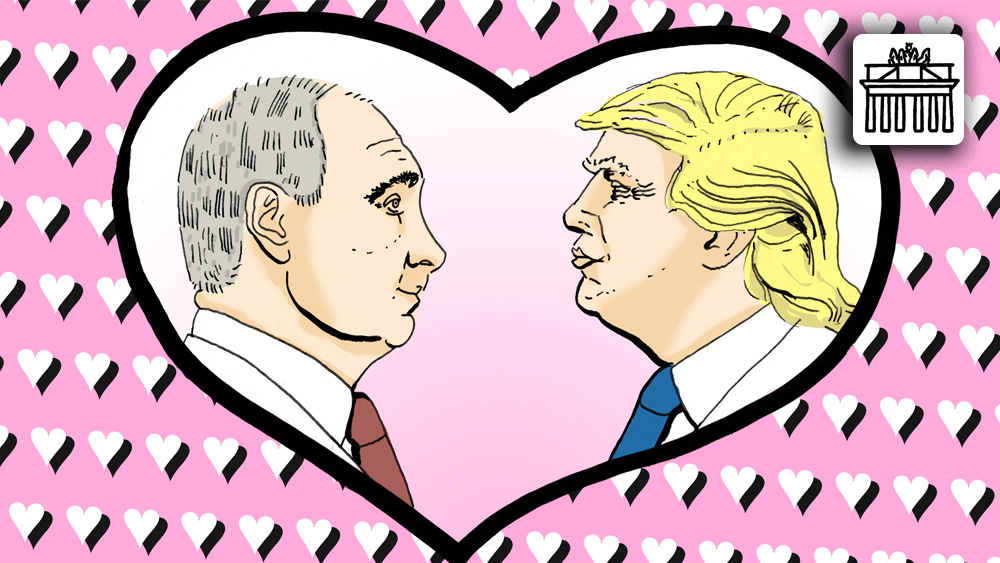Whether describing Donald Trump and Vladimir Putin or Barack Obama and Justin Trudeau – media around the world is in love with a word that entered dictionaries only five years ago. High time to retire it.
Love is a funny thing, especially when it’s between two men who wield great power and influence. For lack of a better word to describe the man hugs and compliments exchanged by the presumptive masters of the universe, American journalists are increasingly adopting a humorous appellation for male friendships once reserved for skateboarders and surfers: the bromance.
“The Trump-Putin Bromance Is Getting Even Shadier,” New York magazine declared as US media picked up on the mutual admiration between Donald, the Republican presidential candidate, and Vladimir, the third-term Russian president. In recent months, mainstream news organizations such as The Washington Post, Bloomberg, and Newsweek have all used “bromance” in headlines to describe the unlikeliest twist in the troubled US-Russian relationship.
In mid-August, Paul Manafort, Trump’s campaign manager, resigned following revelations about his earlier work for Putin’s client in Ukraine, Viktor Yanukovych. Democratic candidate Hillary Clinton’s campaign responded with a statement saying that “you can get rid of Manafort, but that doesn’t end the odd bromance Trump has with Putin.”
It’s fair to say that bromance inflation is eating away at political speech in the United States. Like most pranks, the first time it was funny, the second time absurd, and all subsequent instances totally gratuitous. Now every time two male politicians show the slightest inclination for each other, their relationship is dubbed a bromance, whatever that actually means.
The Merriam-Webster dictionary added bromance to its 2011 edition, along with cougar (“a middle-aged woman seeking a romantic relationship with a younger man”), tweet (as in Twitter), and crowdsourcing. Merriam-Webster defines a bromance as “a close nonsexual friendship between men.”
Empowered with such a sweeping definition, headline writers in recent years have unearthed Putin’s budding bromances with Chinese President Xi Jinping, Israeli Prime Minister Benjamin Netanyahu, and Turkish President Recep Tayyip Erdogan.
The idea of a Putin-Erdogan lovefest is especially nonsensical considering that before their rapprochement this summer, they were slinging insults at each other over a Russian warplane downed by the Turkish air force. Their awkward July meeting in St. Petersburg was reminiscent of the 1939 British cartoon, by David Low, showing Adolf Hitler and Joseph Stalin, then still allies, bowing politely to each on the battlefield. “The scum of the earth, I believe?” the Nazi dictator says as the Soviet tyrant replies: “The bloody assassin of the workers, I presume?” The title of the cartoon is “Rendezvous,” but it could have been “The Hitler-Stalin Bromance.”
Of course today’s bromances aren’t observable only among strongmen and tough guys. After US President Barack Obama visited Canadian Prime Minister Justin Trudeau in Ottawa in June, the White House officially commented on their selfie with the words “true bromance.” It’s possible the term then made its debut in French via the Montreal newspaper Le Devoir.
According to Wired, Obama also has a bromance with his vice president, Joe Biden, and with rapper Jay Z, as revealed by MTV in 2012. In fact, that report “on the most high-profile bromance between a commander-in-chief and a hip-hop figure” may have been the moment when the word jumped from the lingo of pop culture to politics.
The Oxford English Dictionary, which followed Merriam-Webster in acknowledging bromance as worthy of definition, made an online appeal in early 2013 to fathom the expression’s origins. It turns out the earliest known publication of the word was in the April 2001 issue of TransWorld Surf magazine.
The word bro is much, much older. Originally a short form of “brother,” bro then passed into Black English before taking on the present meaning of “a conventional guy’s guy who spends a lot of time partying with other young men like himself,” according to the OxfordWords blog. Bromance is only one word in a growing subset of expressions based on bro, such as brogrammer (“loutish male computer programmer”) or brobituary (“an ex-bro who abandoned the fold and got married”). And then there are the Bernie bros – supporters of Democratic presidential contender Bernie Sanders who became notorious for their sexist attacks against now-Democratic nominee Hillary Clinton.
A word as preposterous as bromance deserves no obituary. More women leaders may be the surest way of ensuring its quick and painless demise. When German Chancellor Angela Merkel met British Prime Minister Theresa May for the first time in July, they held good old-fashioned talks with no bros, no romance, and no nonsense.







